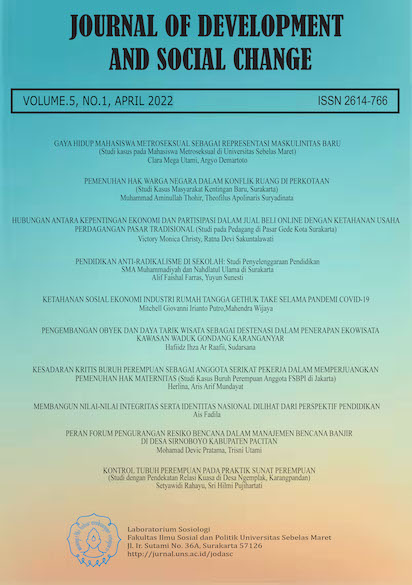STRATEGI PENGEMBANGAN MUSEUM DAYU SEBAGAI SARANA WISATA EDUKASI
Abstract
References
Amrih, Pitoyo. 2008. Ilmu Kearifan Jawa, Pinus Book Publisher, Yogyakarta.
Andre, dkk. 2017. Museums as avenues of learning for children: a decade of research. Learning Environ Res (2017) 20:47–76.
Anshori. 2014. Pengembangan Museum Situs Dayu Sebagai Kawasan Wisata Interaktif Kehidupan Manusia Purbakala. Skripsi. Tidak dipublikasikan.
Choi. 2017. Placing Museum Education in the Intersection of Art and Life. IJEA Vol. 18 Review 2 - http://www.ijea.org/v18r2/.
Cohen, Bruce J. 1992. Sosiologi Suatu Pengantar. Jakarta: Rineka Cipta.
Dewanto, Nirwan. 1996. Senjakala Kebudayaan. Yogyakarta: Yayasan Bentang Budaya.
Geladaki dan Papadimitrio. 2014. University Museums as Spaces of Education: The Case of the History of Education Museum at the University of Athens. Procedia -Social and Behavioral Sciences,147 ( 2014 ) 300 – 306.
Ghafar. 2011. Pengaruh Strategi Positioning Museum Terhada Kunjungan Wisata Edukasi di Kota Bandung (Survey Segmen Pasar Generasi Y). Tourism and Hospitality Essentials (THE) Journal, Vol. I, No. 1, 2011 – 15.
Giddens, Anthony. 2001. Runaway World: Bagaimana Globalisasi Merombak Kehidupan Kita. Jakarta: Gramedia Pustaka Utama.
Hasyim, Muhammad. 2016. Kajian Budaya dan Media. Universitas Hasanuddin Makasar.
Heering. 2017. Science Museums and Science Education. Jurnal Isis-volume 108, number 2, June 2017.
Herdiansyah, Haris. 2010. Metodologi Penelitian Kualitatif. Jakarta: Salemba Humanika.
Herliana, Invani Lela. 2011. Aku Bangga Jadi Anak Kampung, Memaknai Kembali Identitas Kampung Bumen. Yogyakarta: Yayasan Pondok Rakyat..
Kartasapoetra, G dan Kreimers, L.J.B. 1987. Sosiologi Umum. Jakarta: Bina Aksara.
Khudori, Darwis. 2002. Menuju Kampung Pemerdekaan. Yogyakarta: Yayasan Pondok Rakyat.
Kinant, dkk. 2017. Upaya Penyelamatan Benda Purbakala Sebagai Wisata Edukasi. Prosiding Seminar Nasional dan Call For Paper Ekonomi dan Bisnis (SNAPER-EBIS 2017).
Kleden, Ignas. 1987. Sikap Ilmiah dan Kritik Kebudayaan. Jakarta: LP3ES.
Koentjaraningrat. 1994. Kebudayaan Jawa. Jakarta: Balai Pustaka.
Kuntowijoyo. 2006. Budaya dan Masyarakat. Yogyakarta: Tiara Wacana.
Liliweri, Alo. 2002. Makna Budaya dalam Komunikasi Antarbudaya. Yogyakarta: LkiS Yogyakarta.
Moleong, Lexy. 2005. Metodologi Penelitian Kualitatif. Bandung: Remaja Rosdakarya.
Rustopo. 2007. Menjadi Jawa: Orang-Orang Tionghoa dan Kebudayaan Jawa di Surakarta 1895-1998. Jakarta: Ombak.
Sairin, Sjafri. 2002. Perubahan Sosial Masyarakat Indonesia. Yogyakarta: Pustaka Pelajar.
Solihat dan Ary. 2016. Analisa Minat Wisata Museum Kota Bandung. Jurnal Pariwisata, Vol. III No. 2 September 2016.
Sunarto, Kamanto. 2004. Pengantar Sosiologi (Edisi Revisi). Jakarta: FEUI.
Sutopo, H. B.2002. Metodologi Penelitian Kualitatif. Surakarta: Sebelas Maret University Press.
Tomlinson, John. 2003. Globalization and Cultural Identity. Diakses pada 10 Juli 2018 Jam 16:12 WIB.
Williams, Raymond. 1981. Culture. Glasgow: Fontana Paperbacks. Yin, Robert K. 1997. Studi Kasus Desain dan Metode. Jakarta: Rajagrafindo Persada.
Zobuoula. 2018. Virtual Reality and Museum: An Educational Application for Museum Education. International Journal of Emerging Technologies in Learning (iJET) December 2008 DOI: 10.3991/ijet.v3i1.759 · Source: DOAJ.
DOI: https://doi.org/10.20961/jodasc.v2i2.41668
Refbacks
- There are currently no refbacks.




